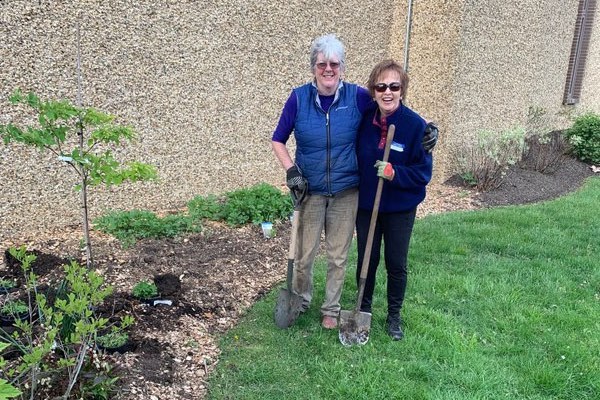Demonstration Gardens are vital educational tools for the Master Gardener program.

Volunteers at work day for LMT Native Garden
As Penn State Extensions explains, "At a Demonstration Garden, we model best practices and inspire our community by showcasing plants that perform well in our climate and soils with minimal maintenance. It is also an excellent way to showcase a specific garden that demonstrates a positive impact or need in the community, such as native gardens, pollinator gardens, and edible demonstration gardens. These teaching gardens are intended to bring awareness to the many different types of gardens that benefit all segments of the population. Demonstration gardens educate, inspire, bring beauty and wellness to the community and represent the Penn State Extension Master Gardener Program."
Bucks County Master Gardeners also do important work that does not fit into the concept of a Demonstration Garden, such as educational programming about composting. We refer to these as Demonstration Sites, places where we provide practical instruction, just like at a garden, but... not a garden.
These ongoing teaching tools provide even more ways for us to educate and empower our community in all aspects of successful and sustainable gardening.
Visit this beautiful demonstration garden that showcases native plants while educating the public about their beauty and value to the ecosystem.

This garden has a dual purpose: it is a teaching garden and a produce resource for the community.

The Garden at the Middletown Grange is designed for both education and relaxation, featuring native and pollinator-friendly plantings, a Little Library, and both resting and picnic benches.

Master Gardeners have rejuvenated the gardens so that the public could be introduced to and educated about the benefits of native plants.

This Native Plant Demonstration Garden is maintained by the Penn State Extension Master Gardeners of Bucks County for the enjoyment of all LMT residents and visitors.

This garden showcases native perennials, shrubs, and trees that attract pollinators and provide refuge and nesting sites for wildlife.

The goal of our garden bed is to be an educational tool for the public and other gardeners at the Community Garden through Master Gardener and Master Watershed Steward Events.

This hands-on learning space educates day campers during the summer, and school children during spring and fall.

This sunny, dry garden was strategically designed to provide year-round visual interest while showcasing native plants that support local wildlife.

